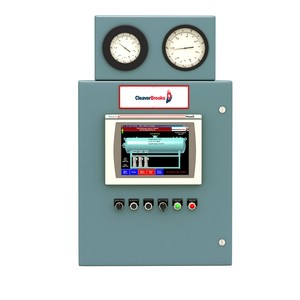ADAC
- Steam applications
- Lead-lag or one-pump-per-boiler control
- Variable speed drive or on-off pump control
- Maintains water level
- Single- or duo-tank system
- Advanced deaerator control system
The ADAC is a PLC-based deaerator and surge tank control system designed to optimize the delivery of feedwater to the boiler ensuring steam reliability and higher operating efficiency. It can monitor and control all points on a deaerator or surge tank and be adapted for the many different boiler systems in modern steam plants.
- Product Overview
- Related Resources
- Applications
- Complete deaerator control and monitoring
- Allen-Bradley PLC based hardware allows for custom programming
- Flexibility and custom applications including: High Pressure Condensate Receivers (HPCR) High Pressure Deaerators (HPDA)
- Communication to BAS
- On-off or variable speed drive control of feedwater and transferpumps
- Control of various in/out and output control valves
The ADAC is a PLC-based deaerator and surge tank control system that can monitor all points on a deaerator or surge tank. The ADAC provides pump control via on/off or variable speed drives, functions as overall tank controls by monitoring and adjusting multiple input valves, condensate return, fresh water make-up, and emergency make-up to maintain consistent water level without overflowing. The ADAC also controls the steam pressure to properly maintain water temperatures and ensures water quality is maintained, extending the life of your boiler. It can communicate data to most BAS systems and/or the C-B Master Panel. The ADAC's interface puts the control of the deaerator or surge tank at your fingertips with its user-friendly menu system and screens.
CASE STUDY
Cleaver-Brooks System Selected for Clemens Food Group Plant →
Provide steam for a new 600,000 square foot pork processing facility.
Boiler Retrofit the Right Solution at Mount Royal University →
Reduce carbon footprint and bring boilers into compliance with local gas code.
Retrofitting Boilers Reduces Emissions and Fuel Usage →
Increase the efficiency and reduce emissions of a nearly 30-year old property.
- Process Steam
- Humidification
- Building Heat
- Sterilization
- Corrugation
- Food Processing
- Waste Heat Recovery
- Healthcare
- Power and Utilities
- Refineries and Petrochemical
- Laundry and Dry Cleaning

